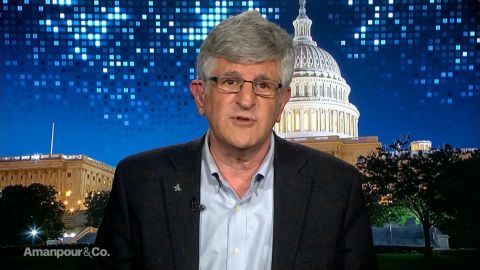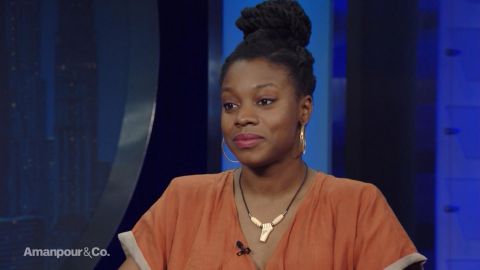Read Transcript EXPAND
CHRISTIANE AMANPOUR: We turn now to a film that tackles issues plaguing America’s small towns, shining a spotlight on health care and housing, “Little Woods” follows two adopted sisters in North Dakota whose troubles have tangled up in poverty, is played by rising stars Lee James and Tessa Thompson. The film was created by the first-time director and writer, Nia DaCosta. And she spoke to our Alicia Menendez about what she was aiming for.
ALICIA MENENDEZ: Nia, thank you so much for joining us.
NIA DACOSTA, DIRECTOR, “LITTLE WOODS”: Of course. Thanks for having me.
MENENDEZ: I loved this film. Congratulations. What led you to this?
DACOSTA: Well, you know it’s kind of a weird roundabout story but I was living in London, getting my Masters after graduating Tisch at NYU. And I have this weird sense of like, homesickness. And it turned out to be this weird Americana sense of like American culture that I really missed. And I sort of had to interrogate that, like what exactly am I talking about when I say like America, Americana? Like what does that mean for me as a woman of color, a New Yorker? And as I was trying to like figure this out, I watched Winter’s Bone and Country Strong. And I was like sorting through like what a movie like that would look like with a black protagonist, with two women living in a rural part of America.
MENENDEZ: You’ve never been to North Dakota?
DACOSTA: No. Never. I didn’t even really know it was going to be centered in North Dakota, initially. I’ve been researching like just rural parts of America like where do I want this to be set, where is the best place to tell my story. I knew it was going to be about health care and I knew there would be an abortion story. I knew I wanted to talk about how women in particular experience poverty, like how it can be a gendered experience. And then while I was trying to find a place in America that was the most difficult to access on abortion, I found this little part of Northwest North Dakota and inside of the town of Williston.
While researching that part of the country, I realized what was happening in these urban towns and how it’s been, not only like redrawing the oil map of the world but also changing how these people live. So like the male to woman ratio would be two to one, for example. And that’s the first thing that I was like “oh, wow, that’s insane.” And also it’d be a really great place to tell the story about how women experience poverty, how they have to access health care, all these things, how different it is for them living in a place like that.
MENENDEZ: I want to take a look at a clip from the film. This is Tessa Thompson, who plays your protagonist Ollie. She has in the past been a drug runner. She is now reformed. She is on the brink of getting a new job which is going to lead her to a new life. And in the middle of the job interview, her past shows up. Let’s take a look.
(BEGIN VIDEO CLIP)
LUCI CHRISTIAN, ACTRESS, “LITTLE WOODS”: So Ollie, your probation officer, Officer Carter —
TESSA THOMPSON, ACTRESS, “LITTLE WOODS”: Carter.
CHRISTIAN: — has told me so much about you. And I think it goes without saying that he must see a lot in you if he’s willing to vouch for you.
THOMPSON: Do you know what, will you just excuse me, I have to go to the bathroom.
CHRISTIAN: Oh, of course.
THOMPSON: I’m sorry. What? What do you want? I’m busy.
MAX HARTMAN: Bernie told me.
THOMPSON: (Bleep) your little Bernie bill. What do you want?
HARTMAN: I want a cut.
THOMPSON: What?
HARTMAN: I know you are selling again and I don’t appreciate losing customers because you decide to get back in the business. So I’ll make you a deal. Give me a cut. I don’t get greedy and I don’t get angry.
THOMPSON: I don’t know who told you but —
HARTMAN: You keep selling and you give me 30 percent. You’re going to cross the border for me. You’re not going to lie to me.
(END VIDEO CLIP)
MENENDEZ: Ollie has gotten back to drug running because her sister is pregnant, the mother’s house is in foreclosure. And you have a line in the script that I love. Your choices are only as good as your options are. These are characters with no good options.
DACOSTA: Yes. And I think that’s a lot of what I wanted to talk about, which was, what drew me initially telling the story was I care a lot about these issues but the way that they were covered was so political and so from a distance point of view from anyone’s actual lived experience. And I think a lot of the time, we view people who are poor or who make decisions we don’t agree with as having some kind of moral character failure when really it’s just people do what they can with the resources they are given. In particular, the characters in this film, the resources that are given aren’t great but their needs are great. And so their choices are really only as good as what they have on them, it’s as good as their options. And so I really wanted that to be the crux of the story.
(BEGIN VIDEO CLIP)
LILY JAMES, ACTRESS, “LITTLE WOODS”: How much over the whole pregnancy — I mean bare minimum — how much is that?
AMPARO GARCIA-CROW, ACTRESS, “LITTLE WOODS”: It depends on your insurance. Your co-pay could be as little as 10, 20 a visit.
JAMES: Yes. What if I lost my insurance?
GARCIA-CROW: No reimbursement. But if you do it right, you can get 12 prenatal visits and some prenatal vitamins. So pregnancy and birth is going to be about $8,000 or $9,000. And if you need a cesarean, $12,000.
JAMES: Being pregnant costs $8,000?
GARCIA-CROW: I’m afraid so, honey.
(END VIDEO CLIP)
MENENDEZ: You’re a person of relative privilege. I mean you grew up in a city. You went to boarding school. You went to an elite institution for a college. What was your access point for talking about this type of challenge?
DACOSTA: It was acknowledging and realizing that. Because I grew up, I would say, poor. My mom would hate me saying that but I didn’t grow up with a lot. And occasionally, I would feel the struggle. My mom kept it that way with me because she is a wonderful mother and person. But you know like I went to private school for most of my life but that was not because it was easy, it’s because I got like 99 percent scholarships. And also my mother would be paying off my middle school when I was in high school, and high school when I was in college. And I still have like six figures of student loans which I will pay off one day, maybe. But at the same time, I live in New York City, a pretty voracious place. I have access to a lot of resources. If I get sick, I can literally walk to the hospital from my house, I can take the train to a Planned Parenthood if I need to get an IUD or a checkup or anything. If I don’t have insurance, which I didn’t have for a very long time after college, usually there’s a way to figure out what to do. And that’s because of where I live and the legislation that’s in place and the organizations that exist here. And so when I realized, oh actually, like I have so much at my fingertips.
And women in a similar situation with me living in places like this do not have those resources. And if they have those resources, they don’t have the information or the ability to access them. So that for me was really what pushed me to work on this story, realizing my relative privilege and wanting to explore that.
MENENDEZ: I want to look at another clip. It was pretty early in the film where you have the sisters visiting their mortgage broker to try to persuade him to sell them back their house. Let’s take a look.
(BEGIN VIDEO CLIP)
JASON NEWMAN, ACTOR, “LITTLE WOODS”: It’s been a rough time for a lot of people.
THOMPSON: Yes. And here we are trying to keep the one thing that we have that nobody else is going to want. Trust me, if you saw the house, you would pay us to keep it. Can you let us just give you half the money? Please?
NEWMAN: I’ll see what I can do.
JAMES: I hate begging.
THOMPSON: Me, it doesn’t exactly float my boat either but three grant would be better than six.
JAMES: It might as well be 50,000.
THOMPSON: Money is money is money when you ain’t got it.
JAMES: Yes.
NEWMAN: If you can get us half the total mortgage in one week, we can redistribute the rest across future payments.
JAMES: That’s great.
THOMPSON: Yes, thank you so much.
NEWMAN: You’re welcome.
(END VIDEO CLIP)
MENENDEZ: You deal with the economic downturn, the housing crisis, the opioid crisis, access to reproductive care. And yet the film doesn’t end up feeling like explicit commentary on any of those things. How did you thread that needle?
DACOSTA: I don’t know if I tried to do that purposely. I knew I definitely didn’t want to have a political statement that I was making inside of the film. I didn’t want to take away from the human stories, from the characters what they’re going through that relationship. But when I was looking at Williston in particular and other urban towns in the area and also looking up at the industrialized towns, all these things just coexist. Like everything is an ecosystem so it wouldn’t have been honest if I just talked about abortion or if I just talked about the oil boom, or if I just talked about housing. And there’s a version of the movie that’s just at one thing and it’s just a movie about one woman’s journey to try to go to Canada to get an abortion. But I’ve realized there was just so much to tell and so I wanted to be honest about how dynamic and complex it is.
MENENDEZ: The other thing I noticed watching that clip is that you have sisters, one adopted, which allows you to place a black character in this landscape, which you said was something you knew you wanted to do. So how did you arrive at that as the mechanism for having Tessa?
DACOSTA: Well, they’re both adopted, actually. How did I write about it? Well, I know I wanted the black lead. And I think a part of my experience being in some private schools as being the only black person, being in a really white area, so I’m familiar with that feeling and how that — what that’s like. And like private school, I was also surrounded by rich, white people, so that’s like a whole other thing. But I know what that’s like and I think that is an interesting dynamic. And then I’m really into the concept of like the family you choose. That’s been a big theme in my life, not just with my friends but also within my family. I have aunts who I’m not related to but the family you choose. You choose to care for people. And so that was just something I thought would be really important. And, yes, I like having women of color, especially black women at the center of my stories. That was kind of inevitable.
MENENDEZ: This film is a blending of genres, part western, part thriller. When you were in the room and you were pitching into people, did people get it?
DACOSTA: Yes, thankfully. And it’s because I had road maps like Winter’s Bone and Frozen River to throw at them and say, look, look at these films. These were about women, they’re about a rural part of America. It was about their struggles, it’s about them doing things that weren’t great but things they had to do because of the lives they led, and it was so great at winning drama. I got to use those two examples. And I love those movies, which is really great. So that was useful. But at the same time, the only people who say yes to this movie where the people who said yes. In a way, it’s like people were like “Wow, I love it, great, very sad, very drama, very difficult.” And I was like I know, but… So of all the people I talked to, like maybe probably not hundreds but sometimes I think it’s over a hundred, only like six or seven said yes.
MENENDEZ: And yet neither of the films you just referenced had a black female leader?
DACOSTA: No. Yes.
MENENDEZ: And so how did that further complicate those conversations?
DACOSTA: I mean interestingly I think it’s an interesting balance of by the time I was pitching to a certain number of investors, Tessa Thompson had been in Creed. She just hasn’t done the right people. So people were like really excited about her. But before she was involved, the black lead definitely was like, “Oh, well, you know.” And it wouldn’t be — I mean you’re not really allowed to talk about it in that way but it was definitely a part of the conversation in sort of coded ways. But because of who Tessa is, it actually made it a bit easier.
MENENDEZ: You have said that you write and love complicated women with agency. Why do we not see more of that in film?
DACOSTA: I think honestly, on a social level, we don’t really enjoy complicated women with agency.
MENENDEZ: In real life.
DACOSTA: In real life, yes. And I think also in Hollywood if you actually just look at the beginning of Hollywood, it’s actually insane. I know we are supposed to be this liberal area but really, it’s really not that progressive. So, now people are really starting to realize. Like actually like complicated women with agency are interesting and everyone wants to watch them. Captain Marvel just came out and yes, that’s a Marvel film but it’s the second highest grossing one so far.
MENENDEZ: Among your next projects is the remake of Candyman, classic horror film.
DACOSTA: Sequel, sequel.
MENENDEZ: Sequel.
DACOSTA: Yes, spiritual sequel.
MENENDEZ: With Jordan Peele producing. Why that?
DACOSTA: Oh my gosh, why not? How could I say no? So Candyman, when I was growing up, when I was younger, was so a part of the fabric of like sort of the cultural fear, sort of in the same names like Bloody Mary because you say his name five times, Mary, he comes, he cut you, and you die. And I love horror films. I love genre films and horror in particular. And being able to take, to do a story like that, with, that’s about black people in a way. I mean the first film is a bit complicated, we could talk about that. But it’s about a set of the black community. It’s about black people. It’s about stories about black stories and history and the horror of it, and the injustice of it in ways. But it’s in this horror context, which is really interesting.
And then on top of that, Jordan Peele I think is just an amazing brain. He’s wonderful, a wonderful human. And I love to get out and it just made sense. It was just really — it’s truly like an honor to be directing that film. It’s kind of exactly what I wanted to do next, which was to do something bigger, do something with a larger scope and to do something in a genre space.
MENENDEZ: Because you want to do it all?
DACOSTA: Yes, I do. Yes. I want to do — I want to keep scaling up. I want to make bigger and bigger projects but also be able to go back and do smaller things but always at the center of these stories being women, in particular women of color, women of agency who are complex and dynamic an unconventional.
MENENDEZ: Thank you so much.
DACOSTA: Thank you. It was so great.
About This Episode EXPAND
Christiane Amanpour speaks with Dr. Paul Offitt about vaccination; and Rob Delaney & Sharon Horgan about their sitcom “Catastrophe.” Alicia Menendez speaks with director Nia DaCosta about her film “Little Woods.”
LEARN MORE


